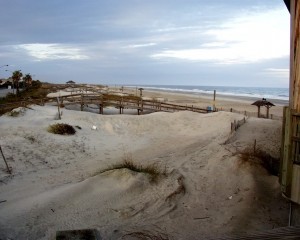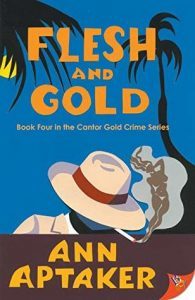Jon Michaelsen's Blog: Ramblings, Excerpts, WIPs, etc., page 10
November 25, 2018
Exclusive Excerpt: The Lawyer Who Leapt (Daytona Beach Book 2) by Frank W. Butterfield
Excerpt:
“Do you have any idea where the place is?” asked Ronnie as he worked at keeping the car on the road. As if from out of nowhere, the wind had kicked up and was blowing Tom’s Buick around the road a bit.
“The judge said they moved the law school out to the airport. I don’t know where, exactly, but it shouldn’t be that hard to find.” He paused and then added, “Howie sent a telegram this morning from Savannah.”
Ronnie whistled. “That was fast. Everything OK?”
“Sounded like it. He mentioned he was keeping his promise to send us one every day.”
Ronnie nodded. “He’s a good kid.”
“He sure is,” said Tom.
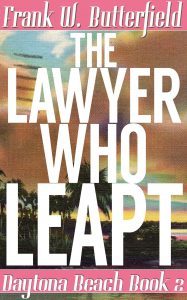 click on image to purchase
click on image to purchaseRonnie burped. “Sorry ’bout that. I shouldn’t have had onions on my burger back at lunch. They always repeat on me.” He burped again.
Out of the corner of his eye, he saw Tom look over at him and smile. “You know, you always say that every time you have onions on anything. But you always have onions.”
Ronnie grinned. He wanted to reach over and put his hand on Tom’s face and pull his pal in close, but he had to keep both hands on the wheel to make sure they stayed on the road. He glanced over and quickly winked at Tom, who blushed.
Neither man said anything for a moment. Then Ronnie asked, “Is that why you love me?”
Tom stiffened, or so Ronnie thought.
. . .
“Is that why you love me?”
Tom could barely believe what he was hearing. How could Ronnie ask him a question like that at a time like this? Tom was doing the best he could to hold his reputation together. Witness tampering was a serious offense and he was looking at serious prison time if he was convicted on the hearsay rumors floating around town that he’d sent Inez Johnson back to New York by bribing her, or whatever they were saying.
He had enough to think about without worrying what Ronnie was going to do next. His friend had always been impulsive. That was what made him so attractive, besides the fact that he was handsome, in an odd sort of way, and was thickly built with plenty of muscles popping out everywhere, something Tom always found attractive in a man.
Staring out at the ribbon of highway that was passing below them in the wind-blown car, Tom thought about their time together the night before and how passionate things had been. That was another thing that attracted him to Ronnie. The man was relaxed when it came to carnal matters. He was friendly and passionate and gentle, while also being driven and almost single-minded in his desire to know that Tom was enjoying himself. It had always been that way.
In the few encounters of a similar nature that Tom had during his time in the Army, he’d been shocked at how selfish other men could be. They seemed to want to be satisfied but had no interest in the sort of quiet conversation intermingled with passionate lovemaking that Tom had always loved having with Ronnie and Sarah, both.
Sarah.
What would she think if she knew what they got up to in the bed she had slept in before she died? Would she be repelled? Disgusted?
Ronnie claimed that she had given her blessing to their fooling around. And, on those nights when she wasn’t home, having taken Missy over to the Gulf Coast to spend a few days with relatives who didn’t like Tom, he and Ronnie would fool around in that bed. But they had never slept together. And Tom had always made sure to change the sheets before Sarah got home.
He couldn’t really imagine the conversation she had with Ronnie about all that. He’d claimed that she’d invited him over for dinner and, while drinking beer, had admitted she knew all about how they felt about each other. He even claimed, Ronnie had, that she had blessed their fooling around.
Tom sighed. He wavered back and forth about whether to believe Ronnie on that score. It seemed both highly unlikely and exactly what Sarah would have done. There had been a number of occasions, during their marriage, when she had kindly sat down with him and told him she knew what he was up to and it didn’t bother her at all. He couldn’t remember the specific things—they had all been small, household sorts of things—but he could easily picture her open and frank expression as she looked right at Ronnie and said something like, “I know you’re in love with Tom as much as I am.”
The sudden intensity of that thought shocked him. Of course she had said that to Ronnie. He didn’t know how he knew, but he did. He could feel in it his bones. Over the sound of the tires on the road and the slight moaning of the wind as it buffeted the car around, he could hear her next sentence, “And I know Tom loves you in a way he could never love me.”
That thought made him jump in his seat.
“You OK, buddy?”
Blurb:
It’s Wednesday morning, September 24th to be precise, and Tom Jarrell is in love. He’s walking through the tree-covered streets of Daytona Beach, on his way to work, and thinking about the wonderful night he just spent. But, when he gets to the office, he realizes he has a few things that need to be done. For one, he needs to file an affidavit in a murder trial, but he’s never done any such thing, so he heads off to his old law school to meet with his favorite professor from before the war to get some much-needed advice. And, while there, he gets much more than he was expecting. Meanwhile, Ronnie Grisham is in trouble with his landlady. He hasn’t slept in his boarding house bed for two nights and she just read her cards last night. Change is coming. Could the cards be pointing to Ronnie? As for Marveen Dodge, her suspicions about what is really going on at the law office of Tom Jarrell, Esquire, is like a simmering pot that could boil over at any moment. And, Alice Watson is doing just fine, thank you very much, and looking forward to a nice Saturday at the beach with her girl. But, none of them expects what happens next as two mysterious girls arrive in town, suitcases in hand… And an unexpected trial gets underway… Read about all of this, and more, in the case of THE LAWYER WHO LEAPT.
 click on image for website
click on image for websiteAuthor Frank W. Butterfield:
Frank W. Butterfield is the Amazon best-selling author of over 20 books and counting in the Nick Williams Mystery series, stories about Nick & Carter, a private dick and a fireman who live and love in San Francisco.
Beginning in 1953, the series follows their adventures as they deal with the wide-ranging consequences of publicly outing themselves long before the term existed.
Refusing to back down, Nick & Carter begin to build a life where they use their resources to help their family as much as they possibly can.
For Nick & Carter, family is a broad term that includes the ones they were both born into as well as the one they choose: the men and women they know, meet, and grow closer to along the way.
Their stories range from the deeply intimate to the broadly political as they move through the changes in American and global culture from the stultifying sameness of the 50s through the tumultuous transformation of the 60s and the chaotic confusion of the 70s.
As time rolls by and their love deepens, they eventually find themselves able to legally marry in the summer of 2008 at the ages of 84 and 86, respectively.
No one will be as surprised as Nick & Carter when that amazing day finally arrives.
To learn more about Frank W. Butterfield’s novels, Nick & Carter and their ongoing adventures, please click the link before for his website.
November 17, 2018
Exclusive Excerpt: The Bellingham Mystery Series Volume 2 by Nicole Kimberling
Excerpt:
To Peter, Samuel Powers was an excellent example of how weird New York style looks on people who are not physically in New York at the time. He wore a V-neck tee with a too-small blazer, cropped chinos, and polished brown loafers with no socks. His bare, tanned ankles dared the world to question his well-examined casualness. He would have looked amazing if he’d been walking through Central Park, holding some kind of whey-enriched smoothie. But sitting in the main offices of the Hamster, surrounded by mismatched office furniture, he just looked like he’d been beamed there from a cooler future—the victim of a science-fiction transporter accident.
At the same time, he looked vaguely familiar. But that might have been because he looked like every other handsome, stylish guy from New York.
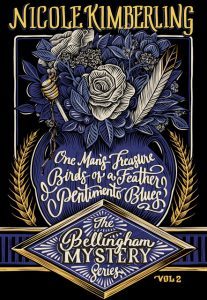 click image to purchase
click image to purchase“I’m sorry I kept you waiting.” Peter extended his hand, and Sam shook it with exactly the right amount of manly pressure and eye contact familiar enough that Peter felt certain that this couldn’t be their first meeting. He considered attempting to fake it—go in for a hug, or air-kiss even, just to take it to the next level—but decided against it. It was far too hot to hug, and he’d never been a kissy guy. “I’m sorry, but have we met before?”
Sam pulled a wide, perfectly toothed smile and said, “I came to your wedding three years ago.”
Now it all fell into place. Sam had attended their wedding as Nick’s agent, Donna’s, date.
The wedding itself had been such a blur—not just because he’d been excited and stressed by the first mingling of his and Nick’s respective families but because one of their guests had attempted to murder Nick. Lesser details of the occasion, like the names of their non-murdering guests, had largely slipped through the cracks of Peter’s memory.
“I’m so sorry.” Peter felt a line of red creeping up the back of his neck. “Please sit down.”
“It’s all right. I don’t think we spoke much beyond the congratulations.” Sam seated himself and then leaned in, elbows on Peter’s none-too-clean desk. “So the reason I’m here is that I’m working on a book and I was hoping I might convince you to help me. It’s about the Werks Collective.”
Peter ran down a list of every collective, commune, and co-op he could recall operating in greater Whatcom County, but nothing rang a bell and he said so.
“It’s the artists’ collective that Walter de Kamp was part of in New York.” At the mention of that name Peter’s naturally ebullient heart cooled to a dull simmer. Of course Sam wanted to talk about Walter de Kamp, Nick’s first lover—the ghost who just
wouldn’t stay down. Every time Peter thought he and Nick had finally broken free of the specter, he rose up to complicate their lives, bringing with him secrets and lies and old history.
“I’m afraid I can’t help you,” Peter said. “I never met the man. And before you even ask, Nick won’t be interviewed about him at all. Ever. Period.”
“Oh, I wasn’t hoping to interview Mr. Olson.” Sam held up his hands as if to show himself innocent of such notions. “I only hoped to have a closer look at a few of the paintings that you two have at your house. I’m specifically interested in the blue landscape in the dining room. It is such an amazing piece. Ever since I saw it three years ago it’s been on my mind.”
“Haunting you?” Peter asked. He couldn’t help it.
“In a way yes,” Sam said, apparently in complete seriousness. “I would be so grateful if you would just let me have another look at it.”
Peter weighed the request. Although it would annoy Nick to have someone in the house, maybe if Sam could publicize the painting, there might be enough interest in it that Nick would finally auction the thing off. After that last piece of Walter’s art had gone, Peter could hire an exorcist, and the spirit of Walter could be laid to rest. He could just picture it: a tall, thin man in a priest’s collar standing before his house, the Castle at Wildcat Cove, eyes pressed closed, whispering in Latin… For an instant, Peter nearly succumbed to his long-standing bad habit of writing the scene out in his head, but Sam had already gathered up his things and started for the door.
“Is it all right if we take my car?” he was saying. That took a moment for Peter to process. Finally, feeling stupid, he said, “You want to go now?” “If you’re free,” Sam returned. Peter glanced across the office at Doug, who had been
observing the entire exchange. Doug gave a silent shrug, which Peter interpreted as a go-ahead. “Let me just take a leak before we head out,” Peter said. Sam magnanimously agreed to wait in the car while Peter took the opportunity of the lone stall in the men’s room to fact-check
Sam’s story. Years ago, before he’d met Nick and taken up amateur sleuthing, Peter would have gotten
into Sam’s car on the strength of his handshake alone. But experience had made him wary of riding in cars with random strangers, well-dressed or not.
Sam Powers’ web page was everything Peter would have wanted for his own. Clear, organized, full of stylish fonts and praise about his writing from the New York Times and the Guardian. It also contained a full bibliography of Sam’s previously published book titles, three of which involved crimes that were related to the art world.
That hurt most of all.
Though Peter had written thousands of articles and even won a national award for journalism, he didn’t have even a single book with his name on the spine. He’d started numerous times, attempting to cobble together a concept that would hold his interest long enough to pitch it to an editor, but after a couple of days’ research into this or that subject he’d lose interest, get depressed, and eventually degenerate into writing fiction.
Bad fiction.
Peter’s narratives brimmed with irrelevant commentary on modern life and lacked in any sort of dramatic tension. He’d even attempted to write pornography, then given up, realizing how hard it was to be shocking in a world where a book about the gay X-rated exploits of were- dinosaurs who strove to control the Freemasons could actually get good reviews.
Now here came Sam Powers, flaunting his ability to stave off boredom by writing incisive long-form prose. Peter had half a mind to crawl out the window but turned instead to Sam’s social media pages, where he found, to his delight, that Sam did have some detractors after all.
Several citizen reviewers called him pretentious and unprincipled. Others disliked his tendency toward wild speculation.
In fact, a brief perusal of Sam’s bio led Peter to believe that Sam was some kind of alternate version of himself—the self that made different choices. Sam’s natal city was the unfortunately named Boring, Oregon—a city whose main claims to fame were having an accidentally funny name and a series of unsolved serial rapes in the late nineties. Whereas in comparison, Peter’s hometown of Bellingham had hosted a great number of actual serial killers in addition to a funny unofficial town motto: City of Subdued Excitement.
Though they both originated in small towns in the Pacific Northwest, Sam had lit out for the Big Apple immediately, whereas Peter had attended the local state university. Where Peter had traveled on his own and taken a long time to settle into writing, Sam landed a magazine gig straight out of private college.
Last, Sam’s Facebook page showed him to be almost relentlessly single up to the point that he started dating Donna, opposite of serial monogamist Peter. Yet the subjects they wrote about and even their writing style seemed eerily similar, like a literary doppelgänger or…evil twin.
So Sam checked out as a legit writer, not a serial killer, hired assassin, or art thief.
And despite the mad jealousy he might feel at Sam’s various awesome book deals, the classy thing to do would be to help him out with his research.
Purchase The Bellingham Mystery Series Volume 2 here:
Amazon: https://www.amazon.com/gp/product/B07J1J49JB/ref=dbs_a_def_rwt_bibl_vppi_i5
Smashwords: https://www.smashwords.com/books/view/899279
Learn more about author, Nicole Kimberling: 
click photo for Nicole Kingerling’s websiteNicole Kimberling is a novelist and the editor at Blind Eye Books. Her first novel, Turnskin, won the Lambda Literary Award. Other works include the Bellingham Mystery Series, set in the Washington town where she resides with her wife of thirty years and an ongoing cooking column for Lady Churchill’s Rosebud Wristlet. She is also the creator and writer of “Lauren Proves Magic is Real!” a serial fiction podcast, which explores the day-to-day case files of Special Agent Keith Curry, supernatural food inspector.
November 11, 2018
Exclusive Excerpt: Late Fees (Pinx Video Mysteries Book 3) by Marshall Thornton
Excerpt:
My mother and I stopped at the top of the stairs. The courtyard below us had been transformed. The metal table we sat around so often had been pushed up against a card table and the two were covered in a festive orange plaid table cloth, set with white dishes and silverware, butterscotch napkins and giant wine glasses. The table, the chairs, and even the ground were covered in brown, yellow, orange and red leaves cut from construction paper. Lights were strung from the bottom of the balcony to the bird of paradise. Marc had brought out their compact stereo outside and a CD was playing, Carly Simon’s My Romance. It felt a little like being in a movie.
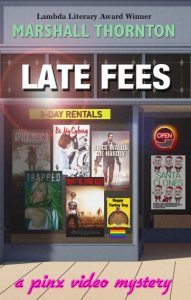 click on image to purchase
click on image to purchase“Oh my goodness, I just thought of something,” my mother said. “We should have brought wine.”
“We’ve had a hectic day. I’m sure they’ll understand.”
The sky was cloudy and there was an occasional gust of wind. Standing in the center of the courtyard were Marc’s friends Deborah and Rob. Marc worked with Deborah at the studio where they did something with numbers. Rob was her husband. I didn’t know them well. She was short and little wide, while he was tall and pale.
Before we started down the stairs, my mother licked her fingers and smoothed down my hair over my right ear.
“There, that’s better,” she said. I felt about eight years old.
We went down the stairs. My mother wore a simple, brown sheath-like dress with low, conservative pumps. When she’d come out of the bathroom she’d whispered, “I have a nicer outfit, but it’s pink and that just seemed wrong.”
“I don’t think we’re expected to grieve for someone we’ve never met.”
“Still, I want to be respectful.”
“We don’t have to whisper. Remember? You drugged her.”
“You don’t have to remind me.”
I introduced my mother to Deborah and Rob. Then Rob pointed out a bottle of wine in a standing ice bucket—which made me wonder, Where do Marc and Louis get these things? Followed immediately by And where do they keep them?
“What kind of wine is it?” my mother asked.
“I don’t know,” Deborah said. “Something from Trader Joe’s.”
“It’s a pinot grigio,” I said, reading the label.
“Oh,” she said, sounding disappointed.
“It’s good,” Deborah said.
“Is it? All right.”
I poured out two glasses, and handed one to my mother. My anemia pill had had a little time to work, so I felt a bit perkier. Or maybe it was just the prospect of dinner.
“How’s your brother, Deborah?” I asked, having met him the past spring.
“Oh, Jamie is great. Loving St. Louis.”
“So he’s not moving out here?”
“No. He’s talking about moving to New York City, but I don’t think he’s going anywhere. He’s really a hometown boy.”
When he visited I got the distinct impression he didn’t much like St. Louis. My guess was he’d be in New York by the end of the year. We talked about northern Michigan for a while after Deborah asked where my mother had come in from. Then my mother asked how they knew Marc and Louis, and was told that he and Deborah worked together at a studio.
“And what do you do there?”
“Ultimates. My department estimates how much a film will make in every market and then we keep track of whether it does or not.”
“Well, that sounds important. And you do that for every movie?”
“All six thousand six hundred and thirty seven. Most of them no one cares about anymore, but the numbers still have to go somewhere.”
Marc came out of the kitchen. He wore a Hawaiian shirt he got at a thrift store over a white tee, khakis and a pair of mahogany Docs. In one hand he held a large plate topped by a folded cloth napkin, an orange and green floral that matched the table. On top of it were nearly a dozen tri-colored raviolis that had been fried in oil. A bowl of mayonnaise-based dip sat next to them.
“I’ve got nibbles,” he said. “Fried ravioli with aioli. How is Joanne?”
“Still sleeping.”
“That’s probably the best thing for her.”
“I think so, too,” my mother said, avoiding my look.
“Who’s Joanne?” Deborah wanted to know. An increasingly complicated question.
“A friend. Her son died last night. She just found out,” my mother explained, impressing me with her brevity.
“Oh my God. What happened to him?”
“Probably an overdose,” I said.
“These raviolis are great,” Rob said.
“Aren’t they?” Marc agreed. “I love when Louis makes them.”
“Is Joanne a friend from Michigan? Or someone you went to school with?” Deborah wondered.
“I met her in a bar at O’Hare.”
“Oh. I see.”
“About eighteen hours ago, give or take,” she admitted.
“Really? Noah, your mother is so much more interesting than mine.”
“Wait until you meet Joanne.”
My mother poked me in the side, the way she had when I was a teenager. Just then, Tina arrived. She wore a baby doll dress in a black-and-white print, a pair of worn yellow cowboy boots and about twenty Bakelite bracelets on one wrist. Her blond hair was caught up in a giant clip at the back of her head.
Greetings were exchanged, Tina knew Deborah and Rob from previous dinners and she’d met my mother on a previous visit.
“It’s nice to see you again, Angie,” she said, giving my mother a Hollywood air-kiss, which she somehow managed to make sincere. Then she dropped her large leather tote onto the ground.
“You don’t have scripts in there?” Marc asked.
“Just two. I may need to sneak off and do a little reading.” She lit a cigarette. “How was your flight, Angie?”
“Oh, the flight was lovely.”
Marc got Tina a glass of wine while we caught her up on the Joanne situation. When we finished, Tina said, “How uncomfortable.”
And, of course it was, particularly now that my mother had basically overdosed our guest on sleeping pills. Well, not overdosed exactly, but it was still unfortunate. Marc drifted off to get another plate of hors d’œuvres.
“So, she’s been sleeping all day?” Tina asked.
I glanced at my mother. “Yes.”
“I suppose that’s a defense,” Deborah said. “Against the grief.”
“That’s true,” Rob agreed. “The mind works things out while we sleep.”
Marc was back, saying, “These are miniature blue corn pancakes with caviar, sour cream and a bit of lemon zest. Just pop the whole thing in your mouth.”
My mother took one, eyeing it curiously. Then, over my shoulder, Marc said, “There you are.”
I turned and saw that our friend Leon had arrived. He was near forty, had dyed his hair platinum blond, and had a face that always looked a tiny bit pinched in judgment. He wore a lose rayon shirt with a black T-shirt underneath, jeans and heavy black work boots. I guessed that he planned to throw the rayon shirt into his car, strap on a leather wrist band, and spend the later part of the evening at The Gauntlet.
“Oh those look lovely,” Leon said, making a beeline for the nibbles.
“We were just talking about the woman who’s sleeping upstairs—” Deborah started.
“The one whose son died?” Leon said. “I know all about it.”
“He called earlier,” Marc explained.
“So, was he murdered?” Leon asked.
“Oh my God, no.” I said.
“Why would you say such a thing?” my mother asked.
Just then Louis ran out of his apartment, oven mitts on both hands, and zipped up the stairs to mine. I was pretty sure I heard him say, “Almost forgot.”
“What was that about?” Deborah asked.
“He put a couple of casseroles into my oven. An hour ago. Maybe more. Tell us more about what you do,” I said, trying to avoid what I knew was coming next.
“Oh no you don’t,” Leon said. “Noah, why don’t you think this woman’s son was murdered?”
“Because it’s much more common to overdose than it is to be murdered.”
“His mother doesn’t think that’s what happened, though, does she?”
Wow, I thought, Marc fit in a lot of detail.
My mother took over. “She says he stopped taking drugs, except for marijuana and alcohol, and she believes him.”
“A mother would, though, wouldn’t she?” I pointed out.
“Well, yes,” she admitted. “I imagine it’s the kind of thing an addict would tell his mother.”
“Lying well is a God-given talent,” Leon said.
My mother put a hand over her mouth while she giggled at that.
“Just because his mother doesn’t think he overdosed doesn’t mean he was murdered,” I said.
Louis came out of my apartment holding the baking tray between oven mitts and balancing the casseroles. Carefully, he descended the stairs.
“Oh dear, that could go terribly wrong,” said Tina. Since she spent her time reading movie scripts, I could see how she was trained to assume that a man carrying a tray of hot food while walking down a flight of stairs was inevitably going to tumble down into a comic heap at the bottom. But Louis made it to the bottom without incident and our dinner was undisturbed. We all breathed a sigh of relief and returned to our fitful conversation.
“I read in the paper today that they’ve had some luck treating AIDS with gene therapy,” Leon said. “They think they may be able to give you a virus that will insert a defective gene into HIV cells.”
“Give a virus to cure a virus?” Marc said skeptically. He switched from passing tiny pancakes to refilling wine glasses.
Leon shrugged. “It does sound a little far-fetched.”
“They might as well inject you with the spaceship from Fantastic Voyage,” I mock suggested. “Raquel Welch could cure AIDS with a miniature stun gun.”
“If only it were that easy,” my mother said quietly.
Leon wandered off toward the stereo. I sipped my wine , it was cool and crisp. “Do you like the wine?” I asked my mother.
“Oh, it’s lovely. Very tart.” I think that meant she didn’t. She preferred sweeter wines.
“Are we going to see Louis at all?” I asked Marc.
“Is there anything we can do to help?” my mother asked.
“Yes, we should help,” Tina said—the woman who’d brought something to read while someone else cleaned up.
“There’s not enough room in the kitchen,” Marc said. “Louis will be out once dinner is served. Don’t worry.”
“Really Marc?” Leon said, coming back from the stereo. “Five CDs and not one of them Barbra or Madonna? Sometimes I wonder if the two of you are homosexual at all.”
“Who is this singing, by the way?” Deborah asked.
“Indigo Girls.”
“Lesbian music,” Leon said, dismissively. “All flannel and strumming guitars.”
“Oh, I have to go,” Marc said , he’d just seen Louis waving him over to the apartment.
“I wish they’d let us help,” my mother said. Determined to mother someone, she asked, “Do you think I should check on Joanne?”
“It’s only been twenty minutes.”
She frowned. “I’m sorry if I’ve ruined your Thanksgiving.”
“Stop saying that.”
“How did you ruin his Thanksgiving?” Leon asked. “Look at him, he’s got a glass of wine in his hand and he’s about to have a wonderful dinner—”
“I know but—if it weren’t for me we wouldn’t have Joanne on our hands and we wouldn’t be talking about that poor dead boy.”
“It’s not your fault, Angie,” Leon said. “Your son is the one who’s a magnet for dead bodies.”
“Mag— Noah, what does he mean?”
“Nothing,” I said pointedly. I gave Leon a searing look.
“Well, he means something.”
I sighed. “During the riots there was a body left in the dumpster behind my store.”
“Oh dear. You never told me. Why didn’t you—”
“And…” Leon said, annoying the heck out of me.
“And another time there was a dead body left here on this table.”
“This table?” My mother pointed at the table we were about to sit down at.
“The round part, not the folding part,” Leon said, getting unnecessarily specific.
“Why didn’t anyone mention that?” Deborah asked.
“They did mention it, honey. They told us all about it, in September I think.”
“What? Wait, no, that was a movie they were talking about. Wasn’t it? You mean it actually happened? Like, right there?”
Marc came out of the house with a small tray holding four soup bowls. “All right everyone, take a seat. We’re going to start with soup. Carrot, apple, and ginger.”
There were three chairs around the folding table and five around the round table. Everyone gravitated toward the folding table except Leon and me.
“Really guys?” I said. “It was months ago and all the dead body cooties have washed off.”
My mother came down and sat next to me in the round portion. “You have a lot to explain,” she said, under her breath.
As we sat down, Leon took a small, black mobile phone out of his pocket and set it on the table next to his setting.
“What is that?” I asked.
“Mobile phone. It’s for work. Insanely expensive. Four hundred dollars last month.”
“But work is paying for it.”
“Well, they pay for the phone itself and all my business calls.”
“How much of that four hundred was personal?”
“All of it.”
My rent was only five-fifty. The phone at the store with three lines only cost a hundred and twenty-five.
“I’m going to be a lot more careful this month,” Leon said, as though we’d all just scolded him. “Cross my heart.”
Marc began placing soups; Louis was right behind him with another tray. As briefly as possible I told my mother the story of Wilma Wanderly and the blue-spangled dresses. When I was done, Marc and Louis were seated in front of their soup.
“See, that still sounds like a movie to me,” Deborah said.
“It sounds dangerous,” my mother said. “You have no plans to ever get involved with anything like that again, I hope.”
“Not unless Joanne’s son turns out to be murdered,” Leon said.
“Even then. We shouldn’t get involved.”
“I agree,” I said. “I’ve had enough of murder.”
“Of course, there’s nothing wrong with a little speculation,” my mother said, making me uncomfortable. It always started with speculation—and then it didn’t end well.
“Her son overdosed,” I said firmly.
“In that case, the question is was it accidental or did he do it on purpose?” Leon asked.
“Did he have a reason to kill himself?” Rob asked, then added, “By the way, the soup is wonderful.”
“Oh, it is. Delicious,” my mother said.
“Nothing Joanne said would lead me to believe he had a reason to kill himself,” I told them.
“But then is suicide a reasonable thing?” Tina asked. “I know we try to make it seem reasonable, but I think it’s usually anything but. Did she say he was troubled?”
“She implied that he used to do drugs, heavier drugs than marijuana,” I told the table.
“I don’t think doing a little of this and a little of that means you’re likely to kill yourself,” Leon said, taking a spoonful of soup.
“If your mother knows about it, then it’s probably not a little of this and a little of that,” Louis pointed out.
“So he had a problem with drugs,” I said. My soup was half gone. It was delicious, sweet and savory at the same time. “Louis, what is in this soup?”
“Oh yes, I’d like to know too,” my mother said.
“Carrots, apples, onions, garlic and chicken stock.”
“If he had a problem with drugs, then I guess he was troubled,” Deborah assumed. “Which means he could have killed himself.”
“But right before his mother arrived? That seems awfully cold,” my mother pointed out. “If it was deliberate, I think he’d have done it after her visit, not before he even got to see her.”
That left us quiet for a moment. It did seem awfully inconsiderate if he’d killed himself before his mother’s visit, but then suicide was not a considerate act, or least not usually.
“And as far as we know there was no note,” I said. “I think the police would have told Joanne if there was.”
“Well, I’m voting for accidental,” Leon said. “As long as we’re sure it’s not murder.”
“It’s not murder,” I said, flatly.
We were done with the soup. Marc got up and began to clear the bowls. Louis started to rise and Marc said, “Sit down. I can do the salad on my own. You need a break before you carve the turkey.”
Louis sat back and took a big gulp of wine, “Okay.” Then to us he said, “I love it when he gets all dominant-like.”
“Why aren’t you with your family, Louis?” my mother asked, ignoring his risqué comment. I was thankful we’d moved on from suicide.
“My sister is in Texas,” Louis said. “My mother takes turns. We’ll have her at Christmas and then next year at Thanksgiving.”
“And Marc, what about his family?”
“They’re in Brentwood. Not on speaking terms.”
“They don’t like that he’s gay?”
“No, they stole most of the money he made as an actor. Marc’s touchy about things like that.”
“As well he should be,” my mother said. “I could never steal from Noah.”
“You stole my U of M sweatshirt.”
“You left it behind. And you never wore it.”
“Well,” Tina said, “my sister is livid that I’m here and not with her. But every time I go to her house she’s livid about something anyway and then we fight the whole time. If she’s going to be mad at me I’d just as soon not be there.”
“Oh my you all have such complicated relationships. Not at all like Grand Rapids.”
“That’s not true, Mom,” I pointed out. “The only difference is that in Grand Rapids everyone pretends to get along. They don’t really know they have a choice.”
My mother ignored the slight to our hometown.
“I saw something interesting in the news today,” Rob said out of nowhere. “A panel the Republicans set up to investigate whether the Reagan campaign worked with the Iranians to steal the presidency from Carter—”
“Oh honey, let’s not talk about this.” Then Debra explained, “He gets this way with a little wine.”
“But it was in the newspaper just yesterday. The same people who committed the crime cleared themselves.”
“But wasn’t Mr. Carter terribly unpopular?” my mother asked.
“He was unpopular because he couldn’t get the hostages out of Iran. During the campaign he was negotiating to get them released, but Reagan sent people over to make sure it didn’t happen. That’s why they wouldn’t release them until after the inauguration. It’s also why the whole Iran-Contra thing happened. Reagan had to pay them back by selling them arms.”
“Oh Rob, please stop.”
“She asked a question.”
Honestly, I didn’t pay much attention to politics. I had no reason to believe that Bill Clinton was going to be much different than George Bush. Leon came to the rescue by saying, “Do you know you can buy your own copy machine for a thousand dollars?”
“What do you want with a copy machine?” Louis asked.
“I don’t know. I could xerox my junk and hand it out at the bars as a calling card. That’s what the mail boys do at work.”
“Other people talk about things they read in the newspaper,” Rob said, before going into a major pout.
“Not everyone enjoys conspiracy theories,” Deborah whispered to her husband. “They’re an acquired taste.”
Marc came out with a tray and began handing us our salads.
“Now what is this?” Tina asked.
“Field greens with blue cheese, bacon and cherry tomatoes, with a raspberry vinaigrette dressing,” Louis said.
“Oh, it looks wonderful.
Marc set the plates down and zipped back into the kitchen for more. Then my mother said, “If Joanne comes down, don’t anyone say anything about suicide. And definitely don’t say anything about murder.”
Blurb:
It’s Thanksgiving, 1992 and Noah Valentine is late picking his mother up from the airport. When he arrives he discovers that she’s made a friend on the flight whose also waiting for her son. When the woman’s son doesn’t show up, they eventually take her home for breakfast with neighbor’s Marc and Louis. Soon after, they learn that her son has overdosed—or has he? Noah and his motley crew investigate over the holiday weekend; which includes a fabulous dinner, a chat with a male stripper, a tiny little burglary and some help from Detective Tall, Dark, and Delicious.
Find more titles by Multi-Lambda Literary Award Winner, Marshall Thornton:
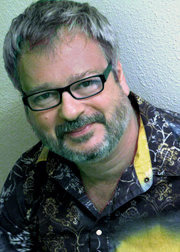 Click on image for website
Click on image for website
November 3, 2018
Criminal Past (Hazard and Somerset Book 6) by Gregory Ashe
Exclusive Excerpt:
Hazard ran. His left arm flopped painfully at his side, phone in his fingers, and his right hand held the .38. He tried to dial, but those fingers were slow and less responsive, and even when Somers’s name came on the screen, the signal was too weak, and the call wouldn’t go through. Swearing, Hazard dove into the darkness. That was what it was like: diving. He would reach the edge of the light, granular, sabulous, like land meeting water, and then he was beyond it, in the darkness, his legs churning to carry him towards that next buoy of light.
Where would the cops drop their guard? Where would they feel a renewed spurt of energy and determination? At the end of the building. At the exit. Where the shooter would linger just long enough to be spotted.
Somers.
Oh fuck.
Somers was faster than Hazard.
Oh fuck.
At the end of the corridor, Hazard was running too fast. He tried to slide into the turn, taking the corner as fast as he could, but he was moving too damn fast. He didn’t fall, and his brain whispered a brief thank you to fate, but he crashed into the far wall, his full weight pinning his bad arm against the drywall. Pain went up like a signal flare. Gasping, Hazard pushed himself off the wall and down the hall.
 click on cover to purchase
click on cover to purchaseHe could see the exit ahead. The door was propped open, and silver daylight framed the opening. In front of that illuminated backdrop, a silhouette moved, fumbling with the door. That was part of the act; an unspoken justification, in case the cops wondered how they’d been lucky enough to catch up with the shooter. Here was the answer, being pantomimed for them: the idiot got stuck at the door.
Only he wasn’t stuck. He was stalling. And as he caught sight of Hazard, he pushed the door open.
Another figure came around the corner at the far end of the hall. He was running. He was moving at full speed. He had the perfect, loping grace that Hazard would recognize anywhere. He had memorized every inch of this man, pieced him together in his mind a thousand times, ten thousand times, over the last twenty years.
“Somers,” Hazard screamed, barely recognizing his own voice. “Stop!”
After that, everything happened at once. A muzzle flashed. The light painted Somers in a hundred different shades of red. It picked out every detail, splashing light and shadow, highlighting the perfect lines of his face, the confusion, the surprise, and underneath it all, etching itself into the skin, fear. A boom echoed down the corridor. Somers tumbled over sideways.
Somers.
Then the shooter shoved open the emergency exit door, and summer light flooded into the Haverford’s fetid darkness, and Hazard could pick out the gleam of that sunlight on the tension wire running six inches in front of his own shin.
Somers.
Hazard cleared the wire. Ten yards to Somers. Eight.
Somers smiling at him in the park.
Six yards.
Somers swinging Evie and laughing.
Five.
Somers naked on the bed, one hand tracing the dark calligraphy across his chest, and wearing that damn smirk he always wore when he knew he was about to get what he wanted.
Three yards. Three.
And then, to Hazard’s surprise, he heard Somers voice. “Go get him. Go get him, Ree. I’m fine. Go after him.”
Again, intuition and instinct took over when emotion fried the rational centers of Hazard’s brain. He swerved towards the exit door, caught it on his bad shoulder, and howled. He didn’t care about the noise at this point. All he cared about was catching this bastard.
The shooter was twenty yards ahead, sprinting full speed down the alley behind the Haverford. In full daylight, seen directly instead of at a distance through a windshield, the man looked different than what Hazard had expected. In spite of the heat, he wore a balaclava, gloves and long-sleeved pants and a shirt. Hazard had already seen in him all that gear, but still, something was different. The difference wasn’t anything Hazard could put his finger on, but he was suddenly less certain about his earlier guess. Was the man older? Younger? Was he not even a man at all? The eyes—from this distance, Hazard could make them out more clearly. Electric green. Like cat eyes.
Hazard put on speed. A fresh wave of adrenaline burned through him, incinerating every thought, and the last one, the one that floated up like a cinder caught on a draft of emotion, was simply: Somers is all right. And then Hazard was moving like a truck.
He hit the shooter at full speed. Hazard meant it to be a tackle, but his bad arm refused to respond, and when they hit the ground, the shooter rolled free instead of staying trapped by Hazard’s mass. Hazard scrambled after the man. He caught an ankle, dragging the shooter back, and the shooter’s other foot shot out and caught Hazard in the chin. Hazard’s head snapped back. Black stars spun in his vision.
But he hadn’t let go, and he hauled on the ankle again. A second kick connected with his head, but this time, Hazard had been expecting it, and he turned so that the blow glanced along the contour of his skull instead of meeting straight on. With as much strength as he could muster, Hazard hauled, and the shooter skidded three feet back over the gravel. Hazard reared back, trying to get enough weight on the bastard to pin him until Somers got there.
This time, though, the shooter reared back and twisted into a punch. Hazard took it as best he could, ducking, but it landed solidly above his ear, and Hazard saw those black stars again. Could feel them, even, prickly against his face. He took another punch, and the third one he managed to knock aside, batting it out of the air like he was Babe fucking Ruth. He just had to hold on. Twenty seconds. Thirty. Somers would be here. Somers was coming.
The next punch was strange; even addled by the blows to the head, Hazard knew something was wrong because the shooter telegraphed the punch loud and clear, and it was obvious that he had changed his target. Instead of throwing another fist or elbow at Hazard’s head, the shooter was aiming down.
At his arm, Hazard realized a moment too late. At his bad arm. The punch was clear as newsprint. If he’d been thinking clearly, if he’d had even an extra second, Hazard could have avoided it. But he was rattled from the earlier blows, and waves of adrenaline battered him, and he hated that arm, that was the bottom of it, he hated that fucking arm because it was useless, and so he didn’t think about it.
The punch landed perfectly, right where a long, jagged cut was still healing, and Hazard’s world went white.
CRIMINAL PAST Blurb:
It all starts to go wrong at the shooting gallery. Emery Hazard and his boyfriend, John-Henry Somerset, just want to enjoy the day at the Dore County Independence Fair. At the shooting gallery, though, Hazard comes face to face with one of his old bullies: Mikey Grames. Even as a drugged-out wreck, Mikey is a reminder of all the ugliness in Hazard’s past. Worse, Mikey seems to know something Hazard doesn’t—something about the fresh tension brewing in town.
When the Chief of Police interrupts Hazard’s day at the fair, she has a strange request. She doesn’t want Hazard and Somers to solve a murder. She wants them to prevent one. The future victim? Mayor Sherman Newton—a man who has tried to have Hazard and Somers killed at least once.
Hazard and Somers try to work out the motive of the man threatening Newton, and the trail leads them into a conspiracy of corrupt law enforcement, white supremacists, and local politicians. As Hazard and Somers dig into the case, their search takes them into the past, where secrets have lain buried for twenty years.
Determined to get to the truth, Hazard finds himself racing for answers, but he discovers that sometimes the past isn’t buried very deep. Sometimes, it isn’t dead. Sometimes, it isn’t even past. And almost always, it’s better left alone.
 click image for Gregory’s website
click image for Gregory’s websiteWant to know more about author Gregory Ashe and his novels?
Check out his website:
October 27, 2018
Available Again – Prince of the Sea by Jon Michaelsen
A gay paranormal mystery/suspense novella
2017 BEST GAY MEN’S FICTION AWARD – G/G Goodreads’ Reading Group
EXCERPT:
Chapter Two
A lone gnat buzzed about Jonathan’s face. He swiped the air in frustration, more at Paul than with irritation at the pest. He had agitated the insect, which fought to escape and yet managed to fly up his nostril. He plugged the side of his nose and tried to flush the pest without success. Finally, and with apprehension, he swallowed to clear his throat.
 click on cover to purchase
click on cover to purchaseDriven by need deeper than thirst, Jonathan ducked inside through the doorway of the single-story cottage and crossed the threshold to the parlor of the west wing, filled with nautical trimmings and reproduced coastal collections. He tore past the cold fireplace and a sofa draped with an old patchwork quilt. The antique double-door bar cabinet nestled in the far corner reminded him of the days his mother had carted him through the vintage shops peppering the Southeastern Coast. In spite of his mood, he smiled at the memories. He snatched a fresh bottle of booze from the shelf below, tossed a couple cubes of ice into his glass, and filled it half-full of scotch.
Jonathan slugged the beverage, refilled his glass, and then shuffled to the floor-to-ceiling windows facing inland. He thought about being stood up by Paul, the knot in his chest traveling up his neck like a hand closing around his throat. Typical. Paul had become more distant of late and the excuses he tried to pass off seemed contrived at best. They were nearing the end of the relationship, perhaps. Jonathan didn’t know anymore, and it drove him crazy.
Stop with the melodramatics, Jonathan chided himself as he sipped his drink and stepped out onto the porch again. He set his cocktail on the railing, reached high above his head, and stretched his arms before crossing them over his chest and gripping his shoulders. The ocean breeze caressed him as he watched the waves rolling in, whitecaps bustling with the fury of stampeding cattle before crashing headlong into shore. Why did it bother him this much? Should he be surprised Paul chose career goals over their relationship yet again? Jonathan should have seen it coming months ago, but he’d ignored the signs, desperate to rekindle the passion slipping away after years of happiness.
A large cargo ship sailed in line of the horizon. Seagulls and pelicans floated along the shoreline searching for food. Jonathan dreamed of a relationship devoid of friction and financial strain, absent of business dinners filled with false hope and weekend interruptions. He savored his career as a successful scriptwriter, but he abhorred the Hollywood lifestyle.
His drink empty, Jonathan began to turn when something caught his eye. Glancing beyond the beach, he scanned the ocean’s surface searching the whitecaps. Someone was bobbing and swirling about in wide circular motions, dipping beneath the waves and resurfacing. Jonathan observed the head and shoulders of a man who seemed to be struggling to remain above the surface. Adrenaline shot through him like a bullet and panic clutched his chest.
He’s in trouble!
Jonathan scanned the beach for help. A few beachcombers walked in either direction along the sand, some strolling hand in hand, as others huddled in groups with a child or two darting out from the pack to race toward the water’s edge. No one seemed to notice the swimmer in distress. Most followed their downcast eyes, searching the beach for the ocean’s treasures washed up in the tide.
“Hey…hey!”
Jonathan raced toward the water’s edge and kicked off his loafers, flailing his arms and screaming trying to attract attention. He ripped off his shirt as he ran, the fabric falling behind in the sand. Pausing to strip off his slacks, he trudged into the sea.
Waves battered him in violent succession, pushing him back, forcing him to lift his knees high to stab his feet into the water to stay righted. When the water reached his hips, Jonathan dove headlong into the churning surf. The smack of cold water against his face and chest sobered him as he pinwheeled his arms through the strong current toward the struggling swimmer.
Where did he go? Jonathan eased up to get his bearings, dogpaddling around and looking for the man. He called out, “Can you hear me? I’m here to help.” He swiveled his head back and forth, searching for the swimmer.
I’ve gone too far, he thought. Jonathan whipped around, turning back toward the beach. The cottage stood farther up the beach than his current position. Fearing the swimmer had disappeared beneath the surface, Jonathan ducked below the water and aimed his body deep, opening his eyes to take a quick peek. The sting of the saltwater forced his lids shut and he retreated.
Jonathan angled his body upward and kicked his feet hard against the strong current. Reaching the surface proved elusive, as the undertow sucked him down. Disoriented and terrified, his lungs begging for air, Jonathan clawed at the wall of seawater to no avail. No matter where he aimed, he couldn’t find the surface. The harder he fought the farther down he sank. Desperate for oxygen, his heart pounding, Jonathan’s life flashed before him.
Is this it? Am I doomed to be another tragic drowning?
Jonathan drifted into a quiet calm from lack of air, his thoughts a random jumble. Why had he charged forth in the first place, foolish considering all the alcohol? What about Paul? Would he be stunned to learn of his death, perhaps feel guilty about refusing to join him sooner? Would his family ever forgive his carelessness?
His chest compressed, expressing the last bit of air from his lungs. He wrestled an onslaught of convulsions as brackish seawater invaded his nose and mouth, his lungs. Arms and legs became lead. He lashed out, each stroke pulling him down until he finally hit the ocean floor.
The undertow snatched him away as his awareness waned. He lashed out in a futile attempt to right himself but grasped onto something slick and supple instead. His fingers slid over the soft object.
Huh?
Something large and powerful slammed into him from behind. He felt an incredible tug against his body, a whoosh that snapped him back like a bungee cord before he blacked out.
Blurb:
Island myth, or guarded secret…destiny lures Jonathan home.
Jonathan’s ten-year relationship with Paul has lost its spark, so in a last-ditch effort to rekindle the passion they once shared, Jonathan rents a seaside cottage in his boyhood hometown; Tybee Island, Georgia, a quaint, tiny coastal islet he abandoned more than a decade or so ago.
But, the romantic surprise backfires royally when his partner rushes off to woo a high-profile client in Chicago, leaving Jonathan alone and broken-hearted. While killing his pain with loads of alcohol the afternoon of his arrival on the beach, nothing seems to ease the gut-wrenching pain.
That’s when Jonathan notices a swimmer caught in a riptide, desperate to stay afloat. Without hesitation, the west coast transplant races to the water’s edge, trudging through seawater before diving headlong into the raucous surf. Soon, he too, falls victim to the fierce undertow, struggling to reach the surface and fearing the worst.
Then a mighty force slams into him from behind, causing him to blackout. When he regains consciousness, Jonathan realizes he is surrounded by horrified beachcombers, all staring at his half-naked body.
How did Jonathan get to shore?
What happened to the drowning man?
And, who is the mysterious old woman gaping at him from afar?
Buy Links:
Amazon: Prince of the Sea in ebook and Kindle Unlimited
Amazon: Prince of the Sea in print
Audible: Prince of the Sea in audiobook
Smashwords: Prince of the Sea in e-book
About Jon Michaelsen
Jon Michaelsen is a writer of fiction in the mystery, suspense and thriller genres.
 click on image for website
click on image for websiteA born southerner born near the Chattahoochee River, his family moved to Atlanta, Georgia when he was a young boy; where he remains today. His debut mystery novel, Pretty Boy Dead, was selected as a Finalist for the Lambda Literary Award in Gay Mystery. He is currently writing the second Kendall Parker Mystery, The Deadwood Murders, expected in early 2019.
He lives with his husband of 32 years and two monstrous terriers.
Contact him: Michaelsen.jon@gmail.com
Join him and get the best eBook deals on a daily basis, directly to your email:
https://www.ebookstage.com/welcome/Mj...
Find Jon Michaelsen on the web:
http://www.jonmichaelsen.net
http://www.jonmichaelsen.com
http://www.facebook/jonmichaelsen
October 20, 2018
Exclusive Excerpt: Touch (The Blake Harte Mysteries Book 8) by Robert Innes
Excerpt:
The house, according to the idle tongues of the locals, had stood there for as long as anybody could remember. It was an old and rickety building, rotting wooden beams festooned around the odd-looking structure that looked very much out of place amongst the considerably more modern and sleek buildings around it. Nobody ever entered it, in fact nearly everyone walked past the house on a day to day basis and completely ignored it. It was, to all intents and purposes, a historic defect in the otherwise tidy street that nobody could be bothered to remove.
And yet, tonight, a ten-year-old boy found himself standing at the front door of the building. Blake Harte had an irresistible urge to explore the unknown coasting through his veins.
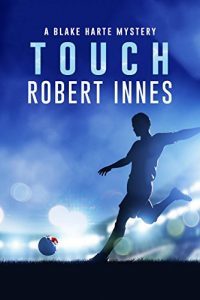 Click on image to purchase
Click on image to purchase
He glanced up at the huge yellow sign, almost as old and out of place as the house itself, warning of the building being unsafe to enter and found himself smiling excitedly. What was being hidden here? What did the people who had put the sign there want to keep secret? Rumours around the classroom varied. Some whispers suggested the possibility that a witch lived there, who only came out when there was nobody to see her, before she set off on her broomstick to cast spells around the neighbourhood. A few of Blake’s classmates were convinced that the house was an entrance to another dimension, and that setting foot inside it would transport the intruder to a world very different to ours. The main form of consensus though was that the house was haunted by the spirits of all who had lived there and there were various murmurings of a headless man prowling the building, looking for his missing head that had been lost in a terrible accident, though Blake did not believe that for a second.
He glanced around as the cold wind whipped up around him. It whistled through the trees, creating the only sound in the otherwise silent street. Blake quickly leaned back and stared down the street in the direction of his house. The lights were all off, his parents fast asleep. The only movement he could see was from the open window of his bedroom on the ground floor, the curtains flapping in the wind, dragged out from where he had climbed out of the window. He had been planning this night all week.
Blake took a deep breath and put his hand on the door handle, then groaned in disappointment. The door was locked.
He stepped back and examined the building, his imagination trying to fathom a way in which he could gain access. As he stared up at the top of the house, a car suddenly roared around the corner of the street, its headlights illuminating him. He froze as the car drew nearer. If somebody he knew saw him sneaking around in the middle of the night, then his parents would soon find out about it and the last thing he wanted was one of his mum’s telling offs.
He leapt around the side of the house just before the driver of the car would have been able to see him and pressed his back against the wall, breathing heavily. Suddenly, the impact of what he was doing threatened to overcome him. He shuddered, half from the cold, half from the thought of what his parents would say if they knew what he was doing, but as the words of his best friend, Tommy Davis, crept into his head, calling him a chicken and daring him to find out what the house was hiding, determination flooded through him again. He had come this far, there was no going back now. He had to get into the house.
He crept around the side of the old building, searching for a way in. He climbed over a small wall and found himself in the garden, or rather, what presumably used to be the garden. Now, it was extremely overgrown and unsightly. Nettle beds were lit ominously by the street lights, surrounded by nests of dock leaves and tall dandelions. As he scrambled through the weeds, trying his best not to get stung, he spotted a small window on the other side of the yard. It was slightly ajar, though as Blake looked closer, he realised that the glass had come loose from the rotting wooden frames. He stood and stared at it for a few moments, debating whether he was really brave enough to try and crawl through. He thought about his other classmates who would give their right arm to be where he was now, then realised that very few of them would have been able to squeeze through the tiny window. Blake had always been teased about how skinny he was, but now, he was starting to see the advantages.
He took a deep breath and hauled himself up to the window. Thin as he was, it was still a struggle to get through the tiny gap. At one point, he stuck fast, his front half suddenly enveloped in darkness as his legs dangled helplessly behind him. He struggled, suddenly too scared to go any further, but by now it was too late to change direction. Even if he wanted to run home and forget all about this crazy idea, he would have to get into the house then climb back out again.
Blake put his hands on the wall and with a huge effort pushed himself through the rest of the window, landing on the floor in a heap, the sound of his body hitting the ground echoing slightly around the pitch-black house.
Blake lay on the floor for a few moments to check that he was the only noise in the house. The dust from the floor tickled his nose and as he stood up, he became aware of the musty smell that reminded him of the local church that his mum sometimes dragged him to on Sundays. His eyes slowly adjusted to the gloominess of the room, not that it gave him much more of a clue what was around him.
He slowly moved across the room, attempting not to trip over anything. As his hands blindly waved about, trying to find the wall, he became aware that he was walking through a puddle of something on the floor. At last, his hands clasped onto a small box protruding from the wall and what was unmistakably a button. He felt more scared now, almost hoping that the light would not work and that he would be left in the darkness, clueless about his surroundings. Then, he could go home, knowing that he had at least tried, but the task had been impossible due to the fact that he could not see anything. Maybe he would come back in the daylight. He could even bring Tommy with him then.
He pressed the light and was immediately blinded by the surprisingly bright light that suddenly flooded the room. Then, he opened his eyes. He immediately wished he had kept them closed.
He was standing in what looked to be a living room, but he was distracted from taking into much of his surroundings when he saw what the puddle on the ground actually was. It was a dark red colour beneath an old rocking chair in the centre of the room. Seated in the chair was an old woman, her face white and her eyes and mouth wide open as if in a silent scream. She was dressed in old, dirty looking clothing and sticking out her back was a large knife. Blake’s breath caught in his throat as he stared at the horrifying sight before him. The pool of blood on the floor glistened in the light beneath the body of the woman. Blake could not move, too terrified to try and force his legs to work.
Then, she cried out his name, her face remaining in her ghastly expression of terror.
“Blake.”
Blake continued staring at her. He tried to run, but the floor seemed to be now gripping over his feet. The carpet swamped around his legs, holding him in place as the name rang out again.
“Blake!”
Then, as the floor tightened its grip around his bottom half, the woman stood up, her face still contorted in a silence scream. She reached towards him, her mouth seeming to open even wider.
“Blake!”
“No!” screamed Blake and put his arms up over his head as the woman leaned closer towards him, her hands flying forwards to grab him.
Then, just as she was about to grab hold of him, Blake Harte opened his eyes with a jolt.
BLURB:
Football fever has Harmschapel in its grip. After decades of failure, Harmschapel F.C has made it to the County Cup final. All hopes are resting on the team’s talented new striker Scott Jennings bringing victory to the village, but the match threatens to bring deep-rooted rivalries to the surface.
Detective Sergeant Blake Harte finds himself forced to sit through the tense final in case of any trouble. Though the last thing he expects is to be thrown into the midst of another impossible crime, he and the rest of Harmschapel Police are left baffled when Scott is murdered in the middle of the match.
With none of the other players anywhere near him at the time of his death, and a stadium full of witnesses that all seem as clueless as each other, Blake is left with very little to go on as to how a killer could have left Scott with a deep wound in his side without being seen.
As the suspect list grows, Blake discovers dark secrets that are desperate to remain hidden. And someone is watching him. Someone who knows Blake Harte and everything he holds dear. They have their own score to settle, and they are about to make the first move in a game that they intend for Blake to lose…
ny
 Click image for Robert Innes website
Click image for Robert Innes websiteLearn more about author, Robert Innes:
Robert Innes is the author of The Blake Harte Mysteries – a series of head scratching and impossible crimes.
When he’s not trying to work out how to commit seemingly perfect murders and building up a worrying Google search history, Robert can be found at his local slimming group, wondering why eating three pizzas in the space of a week hasn’t resulted in a weight loss.
Since the creation of the Blake Harte mystery series in November 2016, each book has become a best seller in LGBT mystery both in the USA and the UK.
October 14, 2018
Exclusive Excerpt: Flesh and Gold (a Cantor Gold Crime – Book 4) by Ann Aptaker
Excerpt:
I’m no saint. I’m certainly no prude. I’ve been visiting cat houses—what the old timers call notch joints back in the States—since I was a teenager and Sig owned a few houses back in our Coney Island days. The professional ladies of pleasure know what they’re doing, and sometimes, on my loneliest nights in my dangerous life, when I miss Sophie so much I’m dizzy with longing, it takes a professional to do what needs doing. And I have a soft spot for the ladies. They and I have something in common: we make our living outside the Law, because the Law dealt both of us rigged hands. The Law says I’m a criminal just because I romance women. And the Law says it’s a crime for the ladies to decide what to do with their own flesh and bones.
I can’t kid myself, though. I know that “the life” can be risky. It’s not unusual for a Lady of Pleasure to have the “pleasure” beaten out of her by rough trade or a vicious pimp who gets his kicks by using her as a slave. The only freedom she can hope for is to grow old, discarded, and die. The idea that Sophie, my Sophie, is caught in such a life scares me to death.
And then there’s the filthy horror that sends its stench through all those other horrors, a scenario twisting me up so bad I can barely breathe: the thought of Sophie pawed over by sweaty tourists and needy locals not only breaks my heart, it makes me sick.
Sure, add hypocrite to my list of sins.
I soothe myself a little by believing that whoever took her would realize Sophie is a class act and would stow her in one of the town’s fancier, ultra-discreet joints catering to the island’s secretive aristocrats and moneyed clientele, the kind of places where the women aren’t batted around, and even protected from violent clients.
It’s been a long time since I was last in Havana and availed myself of its erotic pleasures. Considering the current power shifts in the local underworld, and those gang wars Lansky and Nilo talked about, the Who’s Who of the cat houses is probably not the same Who’s Who I dealt with ten years ago. As far as I know, nobody in the fancier fleshpots owes me any favors, and without an invitation from a regular client or someone else well connected, I can’t get into those joints, and I don’t even know where they are. I can’t get information about those places without help. But until that help comes, I’m on my own, with nowhere to look but the back rooms of bars, the fleabag hotels, and the streets.
Blurb:
Havana, 1952, a city throbbing with pleasure and danger, where the Mob peddles glamor to the tourists and there’s plenty of sex for sale. In the swanky hotels and casinos, and the steamy, secretive Red Light district of the Colón, Cantor Gold, dapper art thief and smuggler, searches the streets and brothels for her kidnapped love, Sophie de la Luna y Sol. Cantor races against time while trying to out run the deadly schemes of American mobsters and the gunsights of murderous local gangs.
Learn more about award-winning author, Ann Aptaker:
 click on photo for website
click on photo for websiteNative New Yorker Ann Aptaker has earned a reputation as a respected if cheeky exhibition designer and curator of art during her career in museums and galleries. Taking the approach that what art authorities find uncomfortable the public would likely enjoy, exhibitions Ann has curated have garnered favorable reviews in the New York Times, Art in America, American Art Review, and other publications.
She brings the same attitude and philosophy to her first love: writing, especially a tangy variety of historical crime fiction. Ann’s short stories have appeared in two editions (2003 and 2004) of the noir crime anthology Fedora. Her flash fiction story, “A Night In Town,” appeared in the online zine Punk Soul Poet. In addition to curating and designing art exhibitions and writing crime stories, Ann is also an art writer and an adjunct professor of art history at the New York Institute of Technology. (Publisher).
October 6, 2018
Exclusive Excerpt: Order and Anarchy (The Thin Blue Line series Book 2) by Patricia Logan
Excerpt:
Felix caught up to Pope when he had to stop to unlock the door. He stepped inside and stopped, turning back to Felix, still frowning.
“What? Go back to the gym and hit Doctor Brian Swenson up for a date, Felix. It’s clear the man is insanely in love with you. He wants you big time. We can be partners at work but dating you was a mistake. I see that now. What could you ever have seen in me if you were dating guys like that before meeting me?” Without waiting for an answer, he started to close the front door.
Felix did the only thing he could do and stuck out his foot to stop it. “Wait, idiot! I told you I needed to talk to you so why won’t you let me say anything?”
Pope yanked the door back open and stared at him, his face a mask of utter misery. “Sorry. What?”
“Let me in.”
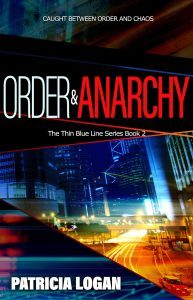 click on cover to purchase
click on cover to purchasePope dropped his gym bag and crossed his arms, blocking the door with his body and staring at him. “Say what you have to say from there. I’m not letting you in.”
Felix ground his teeth. He wanted to punch Pope right in the nose but he couldn’t get his point across if his lover was unconscious.
“You are the man I want, Pope. I’ve told you that before. I want you to live with me. If I wanted Brian Swenson, I would have Brian Swenson, but the man isn’t the kind of guy I want.”
Pope sneered. “Ha! That’s a laugh. Who doesn’t want a brilliant millionaire with a rockin’ body and brain? Huh?”
“Me. It seems I want a grouchy, infuriating, sharp-tonged idiot who doesn’t have a clue how beautiful or sexy he is.”
Pope’s gaze flicked over Felix’s form and then returned to his eyes.
“I’m old and broken and…”
“Asshole!” Felix shoved his way into the apartment, cutting Pope off as he stepped into his personal space and slammed the door behind him. Pope stumbled backward, hitting the wall dividing the entry and the living room. Felix watched him reach back to plant the palms of his hands on either side of himself to stay standing. He braced himself as Felix advanced on him.
“What are you doing?” Pope growled as Felix grabbed the hem of his white T-shirt and ripped it open in one long tear all the way to the neckline. When Pope’s defined six-pack abs were revealed, Felix instantly slid the palms of both hands up the expanse of his stomach and chest.
“If you have to ask that, I’m doing this all wrong.” He bent his head and immediately took one of his nipples into his mouth, biting the nub.
“Jesus!” Pope exclaimed, instantly sinking the fingers of both hands into his hair as he held Felix’s head to his chest. The groan that rumbled out of him vibrated against Felix’s lips as he sucked and laved the hard nub was sexy as hell. He moved to Pope’s second nipple and gave it the same treatment as Pope moaned. He looked up and the sight of Pope’s head thrown back to lean against the wall, his eyes squeezed tightly shut, and his mouth open as his breath came in gasps was a sight to see. He pulled his mouth away and slid down to his knees, reaching for the elastic waistband of Pope’s shorts and pulling them down along with him.
Blurb:
Homeland Security investigators Felix Jbarra and Pope Dades are about to work their first big case as partners. Someone is creating counterfeit government documents and selling them through a site similar to the old Silk Road which was shut down years ago. As they dive into the case with the help of their friends at the FBI and LAPD, Felix and Pope realize the Dark Web site is selling more than documents. It’s selling death.
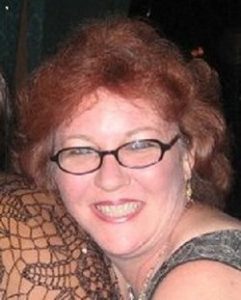 click on image for website
click on image for websiteWhen a man connected with the website turns up murdered, it’s all hands on deck and with so many letter agencies involved in this case, coordinating all parties is bound to be a challenge. When yet another agency unexpectedly gets involved, their bosses would find it laughable if it wasn’t so damned dangerous.
Felix and Pope are getting used to being partners but they are well-trained professionals who must learn to trust each other at work as well as at home. When a bomb almost kills them, they have no choice but to shorten that learning curve. From the mean streets of Hollywood to unfamiliar places on the Dark Net, our heroes put themselves in danger every moment, trying their best to protect innocents while keeping each other alive.
International bestselling author Patricia Logan, resides in Los Angeles, California. The author of several #1 bestselling erotic romances in English, Italian, French, and Spanish lives in a small house with a large family. When she’s not writing her next thriller romance, she’s watching her grandchildren grow up way too soon, and raising kids who make her proud every day. One of her favorite tasks is coaxing nose kisses from cats who insist on flopping on her keyboard while she types. Married to a wonderful gentleman for 30 years, she counts herself lucky to be surrounded by people who love her and give her stories to tell every day.
September 29, 2018
Exclusive Excerpt: The Mystery of the Moving Image (Snow & Winter Book 3) by C.S. Poe
Excerpt:
The kid finally shoved by me and made his way through the aisles toward the door. Calvin saw the push and looked at me, but I shook my head and waved my hand in a shooing motion.
Calvin moved aside, watched the brat storm out, and then joined me. “Who was that?” he asked, leaning down briefly to remove Dillon’s leash.
“The Future.”
He gave me an amused smile. “I see the inclination toward enjoying the company of our country’s youth skips a generation in your family.” He kissed me. “Why’d you call me here?”
“I like you.”
“Nice try.”
“You know how there’s no statute of limitation on murder?”
Calvin reached up to massage his temple. “It was my day off.”
“Look at this.” I tapped the Kinetoscope. “This is an Edison Kinetoscope.”
“Are we talking Thomas Edison?” Calvin crossed his arms, and his biceps flexed and bulged and… distracted.
“Uh—huh. Yeah. That’s the guy.” I looked at the cabinet. “But there was no contact information from the owner inside the crate. No documentation, letter—not even a postcard.”
“I’ve yet to see the correlation between a piece of furniture and murder.”
“It’s a movie viewer,” I corrected. “And—you’re absolutely certain it’s not for you?”
He gave me a critical look.
 click on image to purchase
click on image to purchase“Maybe someone sent you a really morbid birthday present?” I suggested. Not that I sincerely thought it was a gift, but Calvin did work homicide and he was going to be forty-three this Friday. And it had been established how susceptible the Emporium seemed to be to death and mayhem since the two of us met.
“No one would send me an Edison Kinetoscope. What is this about?”
I let out a heavy breath. “It came with a reel of film. It still works, Max and I watched it. It’s the final round of the Leonard-Cushing fight of 1894. It’s not supposed to exist, by all accounts.”
“And did Leonard kill Cushing?” Calvin asked dryly.
“No.” I paused for a beat. “Someone else died, though.”
“It’s a movie.”
“Not—no, the murder isn’t part of the film, Cal. Someone spliced two scenes together. It’s not staged or fake. A man actually died and someone recorded it.” I turned the Kinetoscope on and tugged Calvin close. “Watch it.”
With a sigh, he relaxed his arms and leaned over the peephole to watch the scene. I waited, anxiously studying Calvin’s body posture as the seconds ticked by. Louis Armstrong projected from the shop speakers, Max was chatting up customers, and Dillon wove around this and that across the showroom. When enough time had passed that Calvin would surely have reached the outdoor scene, I noticed his jaw tense. And that was the only reaction I needed to authenticate what I too had seen.
“So?” I asked, for the sake of nicety. Calvin straightened and looked at me. “It’s real, isn’t it?”
“Seb—”
“I told you.”
“Don’t get carried away,” Calvin chastised. “We don’t know anything—when or where or—”
“Mid-1890s. It was filmed relatively close to the same period as the boxing match.”
“How can you tell?”
“The frame rates match, they were both shot with a Kinetograph camera, the film itself was precut—”
“All right,” Calvin interrupted, holding up a hand. “We still don’t even know where this occurred. It could be any city in America that had a camera in the 1800s.”
I looked at the Kinetoscope briefly. “It’s New York—the Flatiron site.”
Calvin narrowed his eyes.
“Before the Flatiron Building actually existed.”
He was quiet, scrubbing his face with one hand. “Sweetheart… how the hell do you know that?” Calvin asked in such a calm, polite tone, it was nearly comical.
“You can sort of see the triangle shape of Fifth Avenue and Broadway in the background,” I explained. “The illumination just out of frame—a man named Amos Eno owned the property until his death in 1899, and he used to project images from a magic lantern onto a canvas screen hung from a shorter building. It was used for advertisements, news bulletins, and even election results.”
Calvin didn’t say anything.
I smiled.
He put an arm around my shoulders, drew me close, and asked, “Anything else I should know?”
“The phrase ‘twenty-three skidoo’ likely originated from the Flatiron’s Twenty-Third Street location.”
“Why’s that?”
“It’s a windy corner. It was suggested that men would stick around the Flatiron to watch women’s skirts get blown up so they could catch some hot ankle action.”
“Of course.”
“Police would have to chase them away.”
“Perverts.”
“Hence, twenty-three skidoo,” I concluded.
Calvin smiled and lowered his arm.
“What’re we going to do about the—” I paused when a customer walked by us. “M-u-r-d-e-r?” I spelled out.
“Nothing.”
“No, not nothing,” I answered.
“That’s about all that can be done, Seb.”
“I know a thing or two about handling evidence in a homicide,” I pointed out. Not that I was a detective or had a degree in forensics, but my ex-partner, Neil Millett, worked for the Crime Scene Unit of the NYPD. Four years of “tell me about your day” had taught me some. Like for example, there were records kept on homicides, even in the 1800s. And if it was an unsolved crime, that evidence was to remain in police possession until the cold case was a closed case.
“You know a thing or two about most everything,” Calvin replied simply. “Which is why it makes it next to impossible to argue that you’re wrong.”
“This is one of those moments I’m not sure if you’re complimenting me or not.”
“Who’s to say this wasn’t solved a long time ago?” I stared at the Kinetoscope. Call it one of my hunches, but I suspected that wasn’t the case. Surely the evidence on film would have been used, even then, to catch the murderer. And after the crime was solved, it would have likely been destroyed by the police. Instead, over 120 years later, the footage was shipped to a moonlighting sleuth.
No explanation.
No reason.
No nothing.
“But what if it wasn’t solved?” I countered.
Calvin crossed his arms again. “The oldest evidence I’ve heard of being held by homicide detectives only went back to 1909. And that was in the ’20s, before complaints of sanitary conditions and limited space were taken into consideration.”
“How do you know that?”
“Hi, I’m Calvin Winter,” he stated, reaching a hand out to shake mine. “I’ve been an officer of the NYPD for ten years.”
“I’m ignoring the sarcasm only because I’m incredibly turned on by you spouting random facts at me,” I answered.
Calvin smirked. “I’ll remember that.”
I looked around the Emporium, did a quick headcount of customers, and made sure Max wasn’t inundated at the counter, before saying to Calvin, “So there wouldn’t be a forgotten box somewhere in the Property Clerk’s Office?” I tried.
Calvin shook his head. “There’s very little, in terms of cold cases, prior to the 1990s.”
“Why?”
He shrugged. “A lot of reasons. Fires, auctions, improper storage and disposal… take your pick.”
“It feels wrong to not do something about it,” I said.
And thankfully Calvin agreed. “I know.”
“Maybe I’ll call the shipping company.”
“Seb—”
“Hey, as far as I am concerned, I’m being held responsible for the condition of the Kinetoscope,” I said quickly. “I need to find the owner.”
“But that’s all,” Calvin answered with a touch of reluctance. “Okay?”
“Okay,” I echoed.
“If I get a call from an irate clerk at the property office this afternoon, we’re going to have words.”
Blurb:
Snow & Winter: Book Three
It’s summer in New York City, and antique shop owner Sebastian Snow is taking the next big step in his relationship with NYPD homicide detective, Calvin Winter: they’re moving in together. What should have been a wonderful week of playing house and celebrating Calvin’s birthday comes to an abrupt end when a mysterious package arrives at the Emporium.
Inside is a Thomas Edison Kinetoscope, a movie viewer from the nineteenth century, invented by the grandfather of modern cinema, W. K. L. Dickson. And along with it, footage of a murder that took place over a hundred years ago.
Sebastian resists the urge to start sleuthing, even if the culprit is long dead and there’s no apparent danger. But break-ins at the Emporium, a robbery, and dead bodies aren’t as easy to ignore, and Sebastian soon realizes that the century-old murder will lead him to a modern-day killer.
However, even with Sebastian’s vast knowledge of Victorian America and his unrelenting perseverance in the face of danger, this may be the one mystery he won’t survive.
FREE DRAWING!
Author C.S. Poe has graciously offered a chance for one member to WIN a FREE e-book copy of (your choice) in the Snow & Winter mystery series (in either mobi, Epub, or PDF format).
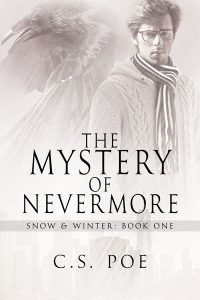 click image to purchase
click image to purchaseTo enter the FREE drawing for Gay Mystery-Thriller-Suspense Facebook group members only, send your name, email address to Jon Michaelsen via Facebook Messenger.
The Winner will be announced on Friday, October 5th @ 8pm EDT. Stay Tuned!
Learn more about author C.S. Poe and her amazing thrillers;
C.S. Poe is a Lambda Literary and EPIC award finalist author of gay mystery, romance, and paranormal books.
She is a reluctant mover and has called many places home in her lifetime. C.S. has lived in New York City, Key West, and Ibaraki, Japan, to
 click on photo for website
click on photo for websitename a few. She misses the cleanliness, convenience, and limited-edition gachapon of Japan, but she was never very good at riding bikes to get around.
She has an affinity for all things cute and colorful and a major weakness for toys. C.S. is an avid fan of coffee, reading, and cats. She’s rescued two cats—Milo and Kasper do their best on a daily basis to sidetrack her from work.
C.S. is a member of the International Thriller Writers organization.
Her debut novel, The Mystery of Nevermore, was published by DSP Publications, 2016.
September 22, 2018
Exclusive Excerpt: Survival is a Dying Art: An Angus Green Novel by Neil Plakcy
Excerpt
In the first chapter of Survival is a Dying Art, Angus Green’s friend Tom invites him to sit in on the meeting of a gay men’s book group.
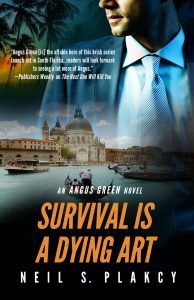 Click cover to purchase
Click cover to purchase“This is emblematic of the problems facing our generation,” another man said. He was a real estate agent with a big personality. “Many of us were shunned by our families when we came out. We didn’t have the opportunities younger people have to get educations and good-paying jobs, so we never made that much money while we worked. And then we lost so many of our friends and lovers to AIDS. Now we’re on our own without pensions or savings accounts or kids to look after us.”
There was a general assent among the men at the table, and I felt guilty about the opportunities my generation had because of the pioneering work these men, and others like them, had done.
“A lot has to do with how soon we came out,” another man said. He’d been introduced as Frank, and I had the sense that he and Tom were friends outside the book group. “I was too scared to come out when I was young, and I covered it up by working my ass off. I made money, yeah, but I never had the life I could have had.”
The doctor nodded. “I married my high school sweetheart because I couldn’t see any other path,” he said. “She worked to put me through college and medical school and gave me two wonderful children. For years I knew that I was gay, but I couldn’t abandon her after all she had done for me. It wasn’t until the kids were grown that I finally told her.”
I couldn’t imagine how painful that must have been for both him and his wife. “Fortunately, she understood, and I was able to keep my relationships with my sons, and now I’m loving being a grandfather. But I know a lot of other men in similar situations who’ve been shunned by their exes and their kids.”
The conversation wandered off onto tangents, and I was amazed at how many different paths these men had taken to get where they were. Tom insisted on paying for my meal, and then asked if I had a moment to speak with him and his friend Frank.
Frank ordered us glasses of Scotch from the bar, and the three of us moved over to stand at the railing overlooking the waterway. It had gotten dark by then, and the only boat moving was a small powerboat with Fort Lauderdale Police along the side and a big searchlight at the prow.
Frank was a couple of inches taller than I was, close to my boyfriend Lester’s height of six-foot-two but much skinnier. His gray hair was close-cropped and there were crow’s feet around his eyes, but I could see he’d been quite handsome when he was younger.
“I was surprised when Tom told me that you work for the FBI,” Frank began. “I wasn’t aware they’d lifted the rules against homosexuals in sensitive positions.”
“That happened long before I joined the Bureau,” I said. “Now there are gay men and women at the highest levels. Even so, I’m the only openly gay special agent in my office.” I took a sip of the Scotch, feeling the warmth on my tongue and the back of my palate. Smooth. “How can I help you?”
“I’m afraid someone might be trying to scam me, and while I don’t want to be taken advantage of, I do want to buy what he says he’s selling.”
“Slow down, Frank,” Tom said. “Go back to the beginning.”
Frank pursed his lips and thought for a moment. “Okay. My family are Italian Jews. Centuries in Venice. Did you know that the word ghetto originated there? It means foundry, and the Jews were segregated in the neighborhood where the iron works were located.”
 Exif JPEG
Exif JPEG“Not quite that far back,” Tom said. “Start with your father and his brother.”
“Sorry.” Frank grinned sheepishly. “I get distracted by all the history. My father and my uncle were born in Venice right after the turn of the century. When he was in his twenties, my father came to the United States, but my uncle Ugo stayed in Venice. He was gay, and he had a lively group of friends, so he had no desire to leave.”
“Until the Nazis came,” I said.
“Until the Nazis came. And by then it was too late.”
We were all quiet for a moment. I imagined that being both gay and Jewish had made Frank’s uncle a prime target.
“A few months ago, I started looking around online to see what might have happened to the painting. I discovered that it had been confiscated by the Nazis, but then it disappeared. I put up a bunch of posts on art and auction sites asking for information, and eventually a man contacted me, saying that he knew where the painting was, and he could get it to me – for a fee.”
I nodded. “And you’re afraid he’s scamming you.”
“Exactly. I did my own research on him and I discovered that he owns a pawn shop in Fort Lauderdale. That made me concerned. I don’t want to be involved in anything shady, and the very fact that he runs an operation like that makes me distrust him.”’
I agreed to help, and we finished our Scotch as people partied on that fancy yacht moored below us. When it came to say goodbye, I kissed Tom’s cheek and hugged him, then shook Frank’s hand, but the two of them seemed unsure what they were supposed to do. I wondered about their relationship – just friends? Or did one of them want something more?
Whatever Tom and Frank wanted from each other, I hoped they could get it. And maybe by helping Frank track down his uncle’s painting, I could pay back Tom for the favors he’d done for me in the past.
 Click image for website
Click image for websiteNeil Plakcy has written or edited over three dozen novels and short stories in mystery, romance and erotica. To research the Angus Green series, he participated in the FBI’s sixteen-week citizen’s academy, practiced at a shooting range, and visited numerous gay bars in Fort Lauderdale. (Seriously, it was research.)
He is an assistant professor of English at Broward College in South Florida, and has been a construction manager, a computer game producer, and a web developer – all experiences he uses in his fiction. His website is www.mahubooks.com.
Ramblings, Excerpts, WIPs, etc.
After publishing sevearl short-fiction stories and novellas, he published his first novel, Jon Michaelsen is a writer of Gay & Speculative fiction, all with elements of mystery, suspense or thriller.
After publishing sevearl short-fiction stories and novellas, he published his first novel, Pretty Boy Dead, which earned a Lambda Literary Finalist Gold Seal for Best Gay Mystery.
He lives with his husband of 33 years, and two monstrous terriers.
Contact him at: Michaelsen.jon@gmail.com
Or the following:
http://www.jonmichaelsen.com
http://www.facebook/jonmichaelsen
https://www.amazon.com/-/e/B002BLLAEG
...more
- Jon Michaelsen's profile
- 125 followers


